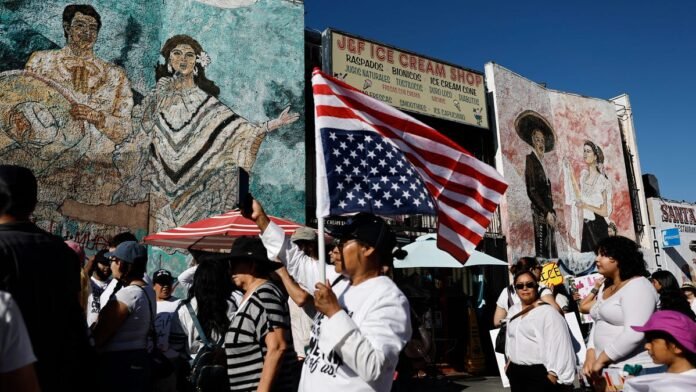One immigrant’s story of what it means to be undocumented
There are an estimated 11 million undocumented immigrants in the U.S. each with their own unique story.
A Catholic bishop who oversees a major diocese in Southern California has issued a rare decree, formally allowing parishioners to miss weekly Mass amid fears of immigration raids across the region.
San Bernardino Bishop Alberto Rojas announced on July 8 that parishioners who have a “genuine fear” over raids by U.S. Immigration and Customs Enforcement were dispensed from their obligation to attend Mass on Sundays and other holy days of obligation, such as Christmas. Rojas noted that “such fear constitutes a grave inconvenience that may impede the spiritual good of the faithful.”
“In issuing this decree, I am guided by the Church’s mission to care for the spiritual welfare of all entrusted to my care, particularly those who face fear or hardship,” Rojas wrote.
Such diocesan-wide dispensations are usually issued in response to serious circumstances or during times of crisis, like the COVID-19 pandemic, natural disasters, and social or political unrest. Observant Catholics are required to attend Mass every Sunday and on holy days of obligation, and those who “deliberately fail in this obligation commit grave sin,” according to the Roman Catholic Catechism.
Rojas’ announcement comes after immigration agents detained migrants at two of the diocese’s parish properties last month, according to the National Catholic Reporter. A spokesperson for the Diocese of San Bernardino told the newspaper that the ICE detentions occurred on June 20 at the St. Adelaide Parish in Highland, California, where several men were detained, and at Our Lady of Lourdes in Montclair, California, where a “longtime parishioner” was detained.
Following the detentions, Rojas said in a letter to his diocese that the immigration enforcement actions were “creating a tremendous amount of fear, confusion and anxiety for many.” The bishop called on public officials to “please reconsider and cease these tactics immediately.”
“We have seen a change and an increase in immigration enforcement in our region and specifically in our diocese,” Rojas wrote in the letter. “Authorities are now seizing brothers and sisters indiscriminately, without respect for their right to due process and their dignity as children of God.”
The Diocese of San Bernardino, east of Los Angeles, was established in 1978 and is the sixth-largest diocese in the United States, according to its website. The diocese says that it serves about 1 million Catholics in San Bernardino County, which is 56.4% Latino, and Riverside County, which is 52.5% Latino, according to the U.S. Census Bureau.
Special decree comes amid objections over Trump’s immigration agenda
The Diocese of San Bernardino’s decree comes amid growing opposition from Roman Catholic bishops across the United States over President Donald Trump‘s immigration agenda. Many bishops have echoed the sentiments of Pope Leo XIV and the late Pope Francis, who both criticized Trump’s stances on immigration.
After taking office in January, Trump dropped a longstanding federal policy against immigration enforcement in sensitive locations, such as schools and places of worship. Multiple religious groups sued the Trump administration over the policy change in February.
But in April, a federal judge ruled against the religious groups, refusing to limit the administration’s enforcement activity, according to Reuters.
Following the 2024 presidential election, the U.S. Conference of Catholic Bishops said that it stood in “firm solidarity with our immigrant brothers and sisters.” Multiple other Catholic leaders have also expressed solidarity with immigrants, the Nashville Tennessean, part of the USA TODAY Network, reported.
The Diocese of San Bernardino appears to be the first to issue a formal dispensation over immigration enforcement. In May, the Diocese of Nashville in Tennessee advised caution for attending Mass, according to the Tennessean.
“We are very concerned that the immigration enforcement activities in the Nashville area are going well beyond efforts to target individuals accused of serious and dangerous crimes,” the Diocese of Nashville said in a statement to The Tennessean. “Concerns about the lack of due process under law for those picked up in the current environment are creating even greater fear within our communities, including the fear of being confronted or detained while attending Mass or other events at our parishes.”
Trump’s immigration crackdown in California
In recent months, the Trump administration has intensified its deportation efforts in California with immigration raids at workplaces, traffic stops, and routine legal check-ins. A series of raids across Los Angeles County sparked intense protests in June.
After the protests — which mainly occurred in a small area of downtown Los Angeles — began on June 6, Trump took several swift actions, including calling in the 4,000 California National Guard troops and 700 Marines. The decision drew ire from California officials who accused the president of stoking tension and escalating unrest.
State and local officials have also repeatedly denounced the federal immigration raids. Earlier this week, Los Angeles Mayor Karen Bass condemned federal agents and National Guard troops for descending on a city park.
Armored vehicles, mounted officers, and armed troops briefly swarmed MacArthur Park in the Westlake neighborhood of Los Angeles before leaving. Bass said 20 children were playing at the park before the troops surged through and shared footage of federal officers running through the park.
“Franky, it is outrageous and un-American that we have federal armed vehicles in our parks when nothing is going on in our parks,” Bass said at a July 7 news conference. “It is outrageous and un-American that the federal government seized our state’s National Guard. It’s outrageous and un-American that we have U.S. Marines who are trained to kill foreign soldiers overseas, deployed in our American city.”
Contributing: Christopher Cann and Anthony Robledo, USA TODAY; Liam Adams, Nashville Tennessean; Reuters


























